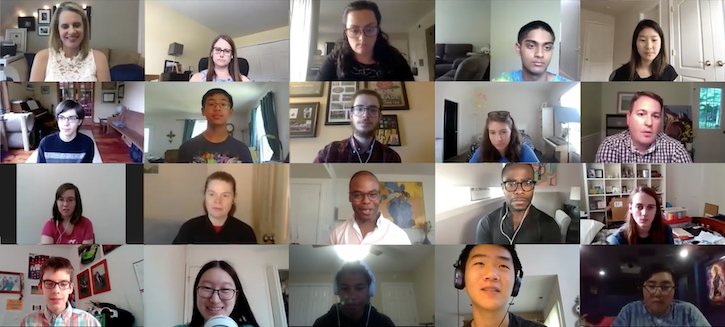
Mason Community Arts Academy hosted a virtual program for middle and high school students that included a session with Demarre McGill, Seattle Symphony’s principal flute, and his brother Anthony McGill, New York Philharmonic’s principal clarinetist. Photo provided
Throughout the coronavirus pandemic, faculty at George Mason University have found unprecedented opportunities to bring in high-caliber speakers who are willing to engage with students in the virtual space. In every part of Mason, from the College of Visual and Performing Arts (CVPA) to the School of Business, Mason faculty have found opportunities to connect students with a variety of speakers, from famous musicians to NASA engineers.
“While in-person experiences are generally preferred, we are able to connect our students with some really interesting speakers in the virtual realm,” said Telecia Taylor, Honors College Living and Learning Community coordinator. “Having speakers in the virtual realm gives people flexibility on both sides. Speakers can work, then meet with students, then get off the Zoom call and go back to working. Students can hear a speaker without having to go to campus.”
Taylor recently organized a visit from a satellite navigation engineer from NASA’s Space Flight Center to speak to the Honors College’s Virtual Learning Community.
During the summer, CVPA’s Mason Community Arts Academy hosted a virtual program for middle and high school students that included a session with Demarre McGill, Seattle Symphony’s principal flute, and his brother Anthony McGill, New York Philharmonic’s principal clarinetist. The prominent Black musicians discussed their career paths and the challenges they faced growing up with students attending the week-long program from all over the country.
“We would never have been able to fly them in to connect with our Mason Academy students,” said Elizabeth “Libby” Curtis, director of the Community Arts Academy. “Having them speak and answer questions on a variety of topics was very inspiring.”
_0.png)
NASA aerospace engineer Ben Ashman recently spoke to Honors College students about the OSIRIS-REx mission to retrieve samples from the asteroid Bennu. Photo provided.
In Kevin Stoy’s “Science, Literature and (Unintended) Consequences” Honors class, Stoy connected Pushcart prize-winning poet Tarfia Faizullah, who was staying in Texas, with his students to listen to her poetry and discuss her career. Stoy said the ability to have Faizullah engage on Zoom with his students was particularly inspiring during the pandemic.
“I wanted my students to meet her and be able to see that poetry is still going on in the middle of a pandemic,” said Stoy. “In fact, poetry and its powerful language can help us transcend this challenging moment.”
In Mason’s School of Business, Peggy Tsirigotis, who teachs Accounting 203, has linked up students with accounting professionals from the major firms, as well as the government. And at the Schar School of Policy and Government, political leaders nationwide have met virtually with students throughout the past few months.
“To be honest, I can barely keep up with the number of amazing speakers that are coming to our virtual events,” said Doug Goldstein, senior associate dean for administration at the Schar School.
Sophomore Lauren Ashton heard Republican strategist Rick Wilson, cofounder of the Lincoln Project, during the Schar School’s First Tuesday guest-speaker series.
“He talked about the importance of to-the-point advertisements. The Lincoln Project’s advertisements, as he pointed out, are targeted, emotionally triggering, different and very effective,” said Ashton. “Overall, the First Tuesday speakers have been a very interesting experience because I got to ask question from people that I never thought I would have the chance to talk with.”
Carol Pineau, a senior fellow at the Schar School, will be leading two virtual study-abroad programs to Africa starting in January. The programs, run through Schar and the Jimmy and Rosalynn Carter School for Peace and Conflict Resolution, will allow students to connect with African leaders. The Carter program, COVID, Narrative, and Development in Post-Conflict Eritrea, focuses on the coronavirus response in Eritrea. The Schar program, called Africa Zooms Ahead, will allow students to see how African-led initiatives are transforming the continent. Students will meet virtually with leading economic and social development leaders, including officials from the African Development Bank and the Africa Finance Corporation, and even engage in cultural exchanges via zoom.
“Once you start accepting that things are what they really are, and we can’t travel in-person right now, you find there are surprisingly interesting opportunities to connect with people in meaningful ways,” said Pineau.
